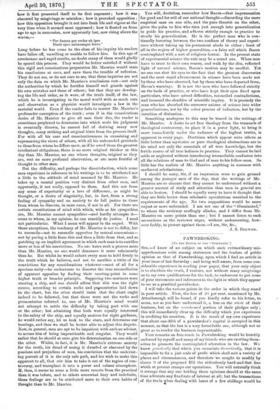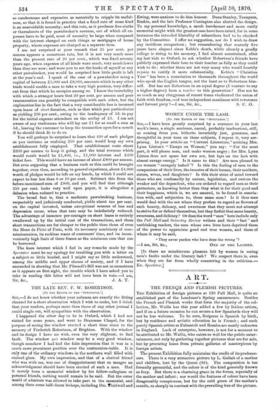PAWNBROKIN G.
[TO THE EDITOR OF THE "EPECTATOR.1
SIR,—I know of no subject on which such extraordinary mis- apprehensions exist among statesmen and the leaders of public opinion as that of Pawnbroking, upon which I find an article in your issue of last Saturday ; and being well aware, from some con- siderable experience in reading your paper, that your only object is to elucidate the truth, I venture, not without many misgivings as to my own qualifications for the task, to endeavour to put some of your statements and inferences in the light in which they appear to me as a practical pawnbroker.
I will take the various points in the order in which they stand in your article. First, the loss of 20 per cent. mentioned by Mr. Attenborough will be found, if you kindly refer to his letter, to mean, not as you have understood it, a loss on the whole of their business, but on the unredeemed portion of their pledges only ; this will immediately clear up the difficulty which you experience in crediting his assertion. It is the result of my own experience that about one-fifth of a pawnbroker's capital is occupied in this manner, so that the loss is a very formidable one, although not so great as to render the business impracticable.
Your remarks on free-trade in Pawnbroking would be heartily endorsed by myself and many of my friends who are exerting them- selves to promote the contemplated alteration in the law. We know practically that which you enunciate theoretically, that it is impossible to fix a just scale of profit which shall suit a variety of places and circumstances, and therefore we sought to modify by clause 9 of the proposed Bill the ridiculously hard-and-fast line which at present cramps our operations. You will naturally think it strange that any one holding these opinions should at the same time advocate any fixed rate of interest at all; but the transactions of the trade then dealing with loans of a few shillings would be so cumbersome and expensive as materially to cripple its useful- ness, so that it is found in practice that a fixed rate of some kind is an unavoidable necessity; and this rate, as it produces five-sixths or thereabouts of the pawnbroker's revenue, out of which all ex- penses have to be paid, must of necessity be large when compared with the interest charged on such things as mortgages of house property, where expenses are charged as a separate item.
I am not surprised at your remark that 25 per cent. per annum appears a monstrous rate, but it is not very much more than the present rate of 20 per cent., which was fixed seventy years ago, when expenses of all kinds were much, very much lower than they are now; and were you to see the books of myself or any other pawnbroker, you would be surprised how little profit is left at the year's end. I speak of the case of a pawnbroker using a capital of between £5,000 and £8,000, amounts which in any other trade would enable a man to take a very high position, very differ- ent from that which he occupies among us. I know the incredulity with which a stranger hears that 20 per cent. per annum and poor remuneration can possibly be compatible with each other, but the explanation lies in the fact that a very considerable loss is incurred upon loans of short duration, such as that which you particularize as yielding 250 per cent., owing to the inadequacy of 5d. to pay for the initial expense attendant on the outlay of £1. I am not aware of any tradesman who will lay out 11 for so small a sum as 5d., leaving the customer to keep the transaction open for a month if he should think fit to do so.
You will perhaps be surprised to learn that 400 of such pledges as you instance as realizing 250 per cent. would keep my own establishment fully employed. That establishment costs about £600 per annum to keep it going, and the total revenue which would result would be £1,400, i.e., £1,000 interest and £400 ticket fees. This would leave an income of about £800 per annum. But even supposing that a business such as this could be brought together, even then, according to general experience, about £4,000 worth of pledges would be left on my hands, by which I could not expect to lose less than 8 or 10 per cent. Subtract this from the before-mentioned sum of £800, and you will find that although 250 per cent. looks very well upon paper, it is altogether a delusion when reduced to practice.
The broad fact is, that a moderate pawnbroking business, respectably and judiciously conducted, yields about ten per cent. on the capital invested, unless exceptional seasons of loss and depression occur, when that rate may be indefinitely reduced. The advantage of immense per-centages on abort loans is entirely swallowed up by the initial cost of the transactions, and these short transactions are far cheaper to the public than those of even the Mont de Piete of Paris, with its necessary machinery of corn- missionnaires, its reckless waste of customers' time, and its incon- veniently high limit of three francs as the minimum sum that can be borrowed.
The keen interest which I feel in any remarks made by the Spectator must be my apology for troubling you with a letter on a subject so little heeded, and I might say so little understood, among the middle and upper classes of society, and if I have succeeded in showing that Mr. Plimsoll's Bill was not so monstrous as it appears on first sight, the trouble which I have asked you to take in reading this letter will not have been in vain.—I am,



































 Previous page
Previous page